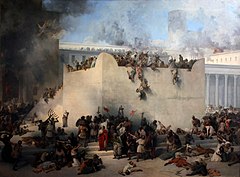Ninth of Ab
| Tisha B'Av | |
|---|---|

Destruction of the Temple of Jerusalem, by Francesco Hayez
|
|
| Official name |
Hebrew: תשעה באב English: Ninth of Av |
| Observed by | Jews |
| Type | Jewish religious and national |
| Significance | Mourning the destruction of the ancient Temples and Jerusalem, and other major calamities which have befallen the Jewish people. |
| Observances | Fasting, mourning, prayer |
| Date | 9th day of Av (if Shabbat, then the 10th of Av) |
| 2016 date | Sunset, August 13 – nightfall, August 14 |
| Frequency | annual |
| Related to | The fasts of Gedalia, the Tenth of Tevet and the Seventeenth of Tammuz, the Three Weeks & the Nine Days |
![]() Tisha B'Av (lit. "the ninth of Av") (Hebrew: תשעה באב or ט׳ באב) is an annual fast day in Judaism which commemorates the anniversary of a number of disasters in Jewish history, primarily the destruction of both the First Temple by the Babylonians and the Second Temple by the Romans in Jerusalem.
Tisha B'Av (lit. "the ninth of Av") (Hebrew: תשעה באב or ט׳ באב) is an annual fast day in Judaism which commemorates the anniversary of a number of disasters in Jewish history, primarily the destruction of both the First Temple by the Babylonians and the Second Temple by the Romans in Jerusalem.
Tisha B'Av is regarded as the saddest day in the Jewish calendar and it is thus believed to be a day which is destined for tragedy.Tisha B'Av falls in July or August in the Western calendar.
The observance of the day includes five prohibitions, most notable of which is a 25-hour fast. The Book of Lamentations, which mourns the destruction of Jerusalem is read in the synagogue, followed by the recitation of kinnot, liturgical dirges that lament the loss of the Temples and Jerusalem. As the day has become associated with remembrance of other major calamities which have befallen the Jewish people, some kinnot also recall events such as the murder of the Ten Martyrs by the Romans, massacres in numerous medieval Jewish communities during the Crusades and The Holocaust.
...
Wikipedia
